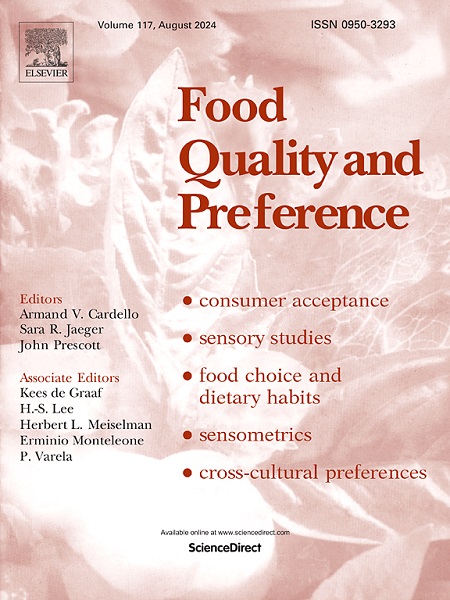Disgusting, sustainable, odd: A study on consumers' social representation of insect-based food and its association with TPB variables
IF 4.9
1区 农林科学
Q1 FOOD SCIENCE & TECHNOLOGY
引用次数: 0
Abstract
Despite their potential as sustainable protein sources, insect-based food products are facing slow acceptance by European consumers. The study investigated societal attitudes toward insect-based foods according to a survey of Italian consumers. Employing the Theory of Social Representation (SR) and the Theory of Planned Behavior (TPB) the study adopted a quali-quatitative approach to identify the interplay between cultural factors and determinants of behavioral intentions to consume insect-based foods.
The study sample (N = 380) responded to a two-part online survey: a free word association task to the stimulus “insect-based food” and a structured questionnaire of TPB variables (attitude toward insect-based food, subjective norm, perceived behavioral control, behavioral intention) and its pertinent extensions, i.e., disgust, food neophobia, and positive moral attitudes. The lexical corpus derived from free associations was analyzed with ALCESTE and the resulting lexical classes were illustrated by means of quantitative measures.
Three social representations of insect-based food, varying in their degree of abstraction/concreteness and perceived safety and effectiveness, were identified and labeled as “Simply Disgusting,” “Nutritious and Sustainable,” and “Curiosity and Caution.” Each representation was associated with a well-defined profile of participants and was clearly linked to participants' beliefs about insect-based food, the moral implications of these dietary choices, and consumers' intentions to purchase such products.
The study suggests the need for targeted interventions to address societal misconception and foster a more favorable perception of insect-based food products as viable food options in European diets. Our findings provide insights for policymakers and producers seeking to promote sustainable dietary choices.
恶心,可持续,奇怪:消费者对昆虫食品的社会表征及其与TPB变量的关系研究
尽管昆虫食品具有作为可持续蛋白质来源的潜力,但欧洲消费者对它们的接受速度很慢。根据对意大利消费者的调查,这项研究调查了社会对昆虫食品的态度。本研究运用社会表征理论(SR)和计划行为理论(TPB),采用定性-定量的方法来确定文化因素与昆虫类食物消费行为意图决定因素之间的相互作用。研究样本(N = 380)回答了两部分的在线调查:一是对“昆虫食物”刺激的自由词联想任务,二是对TPB变量(对昆虫食物的态度、主观规范、感知行为控制、行为意图)及其相关延伸(即厌恶、新食物恐惧症和积极道德态度)的结构化问卷。利用ALCESTE对自由联想产生的词汇语料库进行了分析,并用定量方法对所得的词汇类别进行了说明。以昆虫为基础的食物的三种社会表征,在抽象/具体程度和感知的安全性和有效性方面有所不同,被确定并标记为“简单恶心”,“营养和可持续”和“好奇和谨慎”。每个代表都与参与者的良好定义的概况相关联,并且与参与者对昆虫食物的信念,这些饮食选择的道德含义以及消费者购买此类产品的意图明显相关。该研究表明,需要有针对性的干预措施来解决社会误解,并培养一种更有利的看法,即昆虫为基础的食品是欧洲饮食中可行的食物选择。我们的研究结果为寻求促进可持续饮食选择的政策制定者和生产者提供了见解。
本文章由计算机程序翻译,如有差异,请以英文原文为准。
求助全文
约1分钟内获得全文
求助全文
来源期刊

Food Quality and Preference
工程技术-食品科技
CiteScore
10.40
自引率
15.10%
发文量
263
审稿时长
38 days
期刊介绍:
Food Quality and Preference is a journal devoted to sensory, consumer and behavioural research in food and non-food products. It publishes original research, critical reviews, and short communications in sensory and consumer science, and sensometrics. In addition, the journal publishes special invited issues on important timely topics and from relevant conferences. These are aimed at bridging the gap between research and application, bringing together authors and readers in consumer and market research, sensory science, sensometrics and sensory evaluation, nutrition and food choice, as well as food research, product development and sensory quality assurance. Submissions to Food Quality and Preference are limited to papers that include some form of human measurement; papers that are limited to physical/chemical measures or the routine application of sensory, consumer or econometric analysis will not be considered unless they specifically make a novel scientific contribution in line with the journal''s coverage as outlined below.
 求助内容:
求助内容: 应助结果提醒方式:
应助结果提醒方式:


